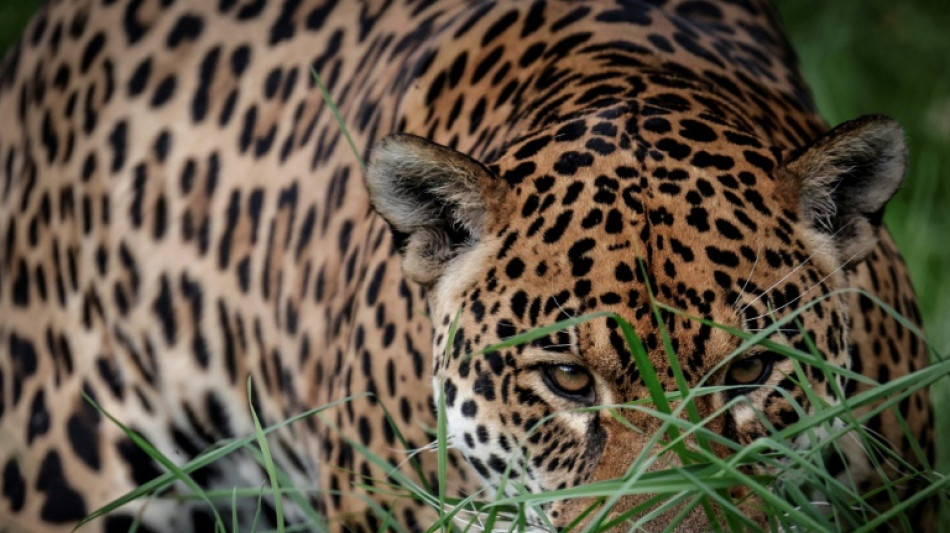
-
 Rubio in Paris to meet Macron on Ukraine war
Rubio in Paris to meet Macron on Ukraine war
-
Asian markets boosted as 'Big Progress' made in Japan tariff talks

-
 Philippine film legend Nora Aunor dies aged 71
Philippine film legend Nora Aunor dies aged 71
-
Taiwan's TSMC net profit soars as US tariff threat looms

-
 Cartel recruitment at heart of Mexico's missing persons crisis
Cartel recruitment at heart of Mexico's missing persons crisis
-
Macron to hold Ukraine war talks with Rubio, Witkoff in Paris

-
 Mahrang Baloch, a child of the resistance for Pakistan's ethnic minority
Mahrang Baloch, a child of the resistance for Pakistan's ethnic minority
-
Myanmar junta says to free nearly 5,000 prisoners in amnesty

-
 Taiwan's TSMC says net profit rose 60.3% in first quarter
Taiwan's TSMC says net profit rose 60.3% in first quarter
-
Hermes to hike US prices to offset tariff impact

-
 Sri Lanka's women-run hotel breaks down barriers
Sri Lanka's women-run hotel breaks down barriers
-
Sweden turns up Eurovision heat with wacky sauna song

-
 Sweden goes into Eurovision as punters' favourite
Sweden goes into Eurovision as punters' favourite
-
Spanish youth keep vibrant Holy Week processions alive

-
 Eurovision promises glitz -- and controversy over Israel
Eurovision promises glitz -- and controversy over Israel
-
Italy's Meloni heads to White House seeking EU tariff deal

-
 F1 on Jeddah's streets - talking points ahead of the Saudi Arabian GP
F1 on Jeddah's streets - talking points ahead of the Saudi Arabian GP
-
Changing face of war puts Denmark on drone offensive

-
 Anger as China club plays hours after striker Boupendza's death
Anger as China club plays hours after striker Boupendza's death
-
Heat scorch Bulls to advance, Mavericks upset Kings

-
 Chinese investment sparks rise of Mandarin in Cambodia
Chinese investment sparks rise of Mandarin in Cambodia
-
Unease grows over Trump tariffs despite 'progress' in Japan trade talks

-
 Nigerian mixed-faith families sense danger as violence flares
Nigerian mixed-faith families sense danger as violence flares
-
Asian markets boosted by 'Big Progress' in Japan tariff talks

-
 No room for sentiment as Hinault returns to site of world title glory
No room for sentiment as Hinault returns to site of world title glory
-
ECB ready to cut rates again as Trump tariffs shake eurozone

-
 Heat scorch Bulls to keep playoff dream alive
Heat scorch Bulls to keep playoff dream alive
-
Nigeria, Niger foreign ministers meet for security talks

-
 Rugby Australia hits out at French clubs poaching young talent
Rugby Australia hits out at French clubs poaching young talent
-
Canada PM Carney avoids French blunder as he faces attack in key debate

-
 El Salvador becoming 'black hole' for US deportees, critics fear
El Salvador becoming 'black hole' for US deportees, critics fear
-
Trump admin proposes redefining 'harm' to endangered animals

-
 Australia's Mary Fowler set for long lay-off after ACL injury
Australia's Mary Fowler set for long lay-off after ACL injury
-
Rubio to meet French leaders for talks on Ukraine

-
 Webb spots strongest 'hints' yet of life on distant planet
Webb spots strongest 'hints' yet of life on distant planet
-
OMP Positioned Highest for Ability to Execute in the 2025 Gartner(R) Magic Quadrant(TM) for Supply Chain Planning Solutions

-
 DEA Diversion Bureaucracy Undermines President Trump's America Pharmaceutical First Agenda
DEA Diversion Bureaucracy Undermines President Trump's America Pharmaceutical First Agenda
-
Evotec SE Unveils New Strategy and Provides 2025 Guidance Bolstered by Strong Q4 2024 Results

-
 Arteta's Arsenal come of age with Madrid masterclass
Arteta's Arsenal come of age with Madrid masterclass
-
None spared in Nigeria gun, machete massacre: survivors

-
 'No problem' if Real Madrid replace me: Ancelotti
'No problem' if Real Madrid replace me: Ancelotti
-
Inter dreaming of treble glory after reaching Champions League semis

-
 'No limits' for treble-hunting Inter, says Pavard
'No limits' for treble-hunting Inter, says Pavard
-
Inter off Bayern to reach Champions League last four

-
 Rice 'knew' Arsenal would dethrone Real Madrid
Rice 'knew' Arsenal would dethrone Real Madrid
-
US stocks fall with dollar as Powell warns on tariffs

-
 Arsenal oust holders Real Madrid to reach Champions League semis
Arsenal oust holders Real Madrid to reach Champions League semis
-
Arsenal defeat Real Madrid to reach Champions League semis

-
 AMD says US rule on chips to China could cost it $800 mn
AMD says US rule on chips to China could cost it $800 mn
-
Inter hold off Bayern to reach Champions League last four


Wildlife populations plunge 73% since 1970: WWF
Wild populations of monitored animal species have plummeted over 70 percent in the last half-century, according to the latest edition of a landmark assessment by WWF published on Thursday.
Featuring data from 35,000 populations of more than 5,000 species of mammals, birds, amphibians, reptiles and fish, the WWF Living Planet Index shows accelerating declines across the globe.
In biodiversity-rich regions such as Latin America and the Caribbean, the figure for animal population loss is as high as 95 percent.
The report tracks trends in the abundance of a large number of species, not individual animal numbers.
It found that populations under review had fallen 73 percent since 1970, mostly due to human pressures.
The index has become an international reference and arrives just ahead of the next UN summit on biodiversity, which will spotlight the issue when it opens in Colombia later this month.
"The picture we are painting is incredibly concerning," said Kirsten Schuijt, Director General of WWF International, at a press briefing.
- Tipping points -
"This is not just about wildlife, it's about the essential ecosystems that sustain human life," said Daudi Sumba, chief conservation officer at WWF.
The report reiterates the need to simultaneously confront the "interconnected" crises of climate change and nature destruction, and warned of major "tipping points" approaching certain ecosystems.
"The changes could be irreversible, with devastating consequences for humanity," he said, using the example of deforestation in the Amazon, which could "shift this critical ecosystem from a carbon sink to a carbon source."
"Habitat degradation and loss, driven primarily by our food system, is the most reported threat in each region, followed by overexploitation, invasive species and disease," the report said.
Other threats include climate change, in particular in Latin America and the Caribbean, and pollution, notably in North America, Asia and the Pacific.
- 'Incredibly concerning' -
The biggest decline is found in populations of freshwater species, followed by terrestrial and marine vertebrates.
"We have emptied the oceans of 40 percent of their biomass," said Yann Laurans of WWF France.
Continent by continent, the average decline reached 95 percent in Latin America and the Caribbean, followed by Africa, down 76 percent, and then Asia and the Pacific, which declined 60 percent.
The reduction in populations is "less spectacular" in Europe, Central Asia and North America.
Some populations have stabilised or even expanded thanks to conservation efforts and the reintroduction of species, the report said.
The European bison, for example, disappeared in the wild in 1927 but in 2020 numbered 6,800 thanks to large-scale breeding and successful reintroduction, mainly in protected areas.
While calling the overall picture "incredibly concerning," Schuijt added: "The good news is that we're not yet past the point of no return."
She pointed to global efforts including a breakthrough pact landed at the last UN meeting on biodiversity in 2022 to protect 30 percent of the planet by 2030 from pollution, degradation and climate change.
But she warned, "all of these agreements have checkpoints in 2030 that are in danger of being missed."
Several scientific studies published by the journal Nature have accused WWF of methodological biases in its index that lead to an exaggerated extent of the decline of animals.
"We remain really confident of its robustness," said Andrew Terry of the Zoological Society of London at a press briefing, highlighting the use of a "range of indicators, looking at extinction risk, biodiversity and ecosystem health to really broaden that picture".
S.F.Warren--AMWN



